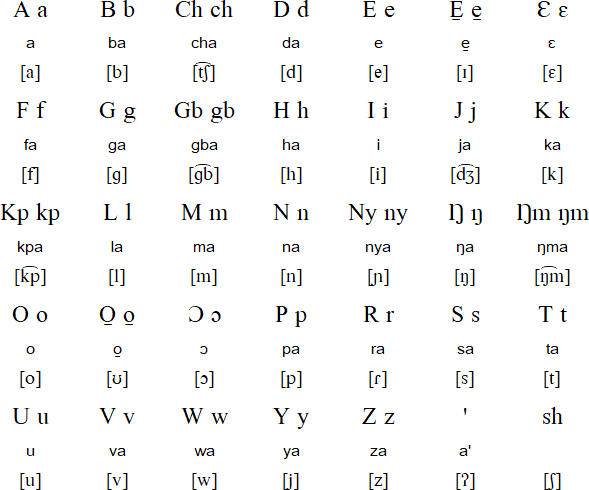Safaliba is member of the Northern Gur branch of Niger-Congo language family. It is spoken by about 7,000 people in northwestern Ghana, particularly in the Bole District of the Savannah Region. There are also some speakers in Côte d'Ivoire (Ivory Coast).
Safaliba is also known as Safali, Safalaba, Safareba or Safalba. It is closely related to Dagaare.
A way to write Safaliba using the Latin alphabet was developed in 1996 by Edmund Kuŋi Yakubu, a Safaliba teacher and activist, and revised by Paul and Jennifer Schaefer between 1999 and 2003. There are plans to teach Safaliba-speaking children to read and write their language in some primary schools.

Long vowels are doubled (aa).
Download an alphabet chart for Safaliba (Excel)
Some details provided by Michael Peter Füstumum
A ŋaa, o̱ ba ɛ' yini "solime" gbagba ŋ lɛ' woo. O̱ ɛ' naaŋ yini ye' be̱lɛ e̱ haŋ nya' yɛla haŋ pake̱ nɛra. Yooni kpaŋ yaŋ, Ɛɛŋ, ŋ aso̱ba Abulai ane̱ ŋ aso̱ba Yɛle̱waya, ba be' bee, baŋ zaa be' po' kpenleeri ne̱ ŋ aso̱ba Bokoro.
As for this, be aware that it is not like an actual "story". It is really more like what you may have seen happen to a person. One year, my uncle Abulai and my uncle Yeliwaya, there they were, they both were farming together with my uncle Bokoro.
Source: http://rc.library.uta.edu/uta-ir/bitstream/handle/10106/1669/Schaefer_uta_2502D_10219.pdf
Information about Safaliba
https://en.wikipedia.org/wiki/Safaliba_language
https://fr.wikipedia.org/wiki/Safaliba
https://de.wikipedia.org/wiki/Safaliba_(Sprache)
https://www.facebook.com/SafalibaLiteracy/
https://rc.library.uta.edu/uta-ir/handle/10106/1669
Berba, Birifor (Northern), Birifor (Southern), Dagaare, Dagbani, Frafra, Gourmanchéma, Hanga, Kabiye, Kasem, Konkomba, Kulango, Kusaal, Láá Láá Bwamu, Mampruli, Mbelime, Moba, Mossi, Nateni, Ngangam, Ntcham, Paasaal, Safaliba, Sisaali, Tammari, Tem, Tumulung Sisaala, Turka, Waama, Western Sisaala
Languages written with the Latin alphabet
Page created: 31.05.23. Last modified: 20.08.23
[top]
You can support this site by Buying Me A Coffee, and if you like what you see on this page, you can use the buttons below to share it with people you know.

If you like this site and find it useful, you can support it by making a donation via PayPal or Patreon, or by contributing in other ways. Omniglot is how I make my living.
Note: all links on this site to Amazon.com, Amazon.co.uk
and Amazon.fr
are affiliate links. This means I earn a commission if you click on any of them and buy something. So by clicking on these links you can help to support this site.
[top]